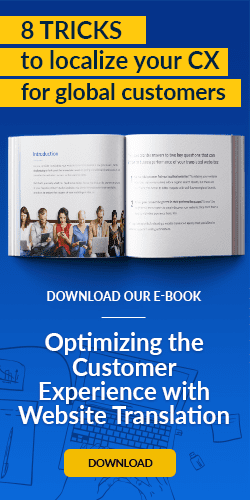Expanding into Québec is a great business decision—in recent years, its household income, population growth and economic growth have been on the rise. However, this savvy move comes with a linguistic obligation. Your company’s offline and online content must serve Québec’s 6.1 million French-speaking customers.
This isn't a nice-to-have; it's the law. The mandate of the Office québécois de la langue française (OQLF) is to ensure that French is the normal and everyday language used for communication, commerce and business in Québec. The agency is also responsible for ensuring compliance with this Charter of the French Language.
The French language has always been important to Québec’s residents. In fact, on Tuesday, the local government proposed a change to the province’s rules on company signage (more on this in a moment) to require French-language slogans or descriptors providing insight into what the business does.
“Every person, whether driving on a highway, on a sidewalk, in an industrial area or in a commercial parking lot, will know they are in Quebec,” an official said on Tuesday, “because they will see French on the signs.”
What Does the Local Law Mean For Companies?
What do these French-centric policies mean for Canadian and foreign companies? If you're operating a brick-and-mortar business in Québec, your store's signage (and more) must be available in French. So must your corporate website.
Laws are different for online-only businesses, however. Companies that aren't physically based in Québec aren't required to operate localized websites to serve French-speaking residents.
That doesn't mean they shouldn't, though. More than 80% of Québec residents speak French as their first language. (This increases to 95%, when including residents who speak French as their first or second language.) Ignoring the opportunity to serve these online consumers in their language of choice leads to lost sales and revenue.
What Must Be Translated?
Whether you operate a physical location in Québec or an online-exclusive business, note that the remainder of the OQLF's charter still applies. Catalogues, brochures, contracts, signs and product labels must be in French. Some general legal obligations include:
Catalogs and Brochures
Generally speaking, catalogs, brochures, folders, commercial directories and similar publications must be available in French. Documents may be bilingual, or may be offered in two versions-one exclusively in French, the other exclusively in another language-provided the French version is available with equal accessibility and quality as the other options.
Computer Software
All software, including games and operating systems must be available in French. Software can be available in other languages, of course, but the French version must have technical parity with these other versions.
Product Labeling
Every inscription on a product and all documents that accompany that product (such as warranties or warnings) must be in French. The French inscription may be accompanied by a translation, provided that the French text has greater prominence.
Public Signs, Posters and Commercial Advertising
As a general rule, public signs and posters may be both in French and in another language, provided that the French is “markedly predominant.”
However, there are two circumstances in which commercial advertising must be exclusively in French. The first is commercial advertising displayed on billboards, signs or posters of 16 meters or more, and visible from any public highway (unless the advertising is displayed on the premises of an establishment of the firm). The second is advertising on or in any public transportation, and on or in accesses to the transportation.
The changes proposed on Tuesday would alter these requirements to include French messaging, providing information on the business.
Registered Trademarks
Registered trademarks may be used in catalogues and brochures, on product labels, public signs and posters, and in commercial advertising. If a French version of the trademark has been registered, however, the French version must be used.
Contracts
Contracts pre-determined by one party and standard printed form contracts must be drafted in French. However, they may be in another language exclusively at the express request of the parties.
Francization of an Organization
Organizations operating in Québec with 50 or more employees must register and provide a summary of its linguistic situation to the OQLF. Once the Office reviews and examines this information, it will determine if French is demonstrated at all levels within the organization (for example, written communications between employer and employee in French, or new positions and promotions offered in French) and will issue a "francization certificate." If the organization doesn't meet these requirements, it must adjust and adopt a francization program.
For organizations with 100 employees or more, a francization committee must be formed. This committee must monitor the organization's use of the French language, and ensure it is demonstrated at all levels.
Government grants can help with francization costs. For companies with up to 99 employees, the OQLF may cover up to 75% of associated costs (up to $50,000 before taxes). Covered expenses can include keyboards, software, website translation, and more.
Insights Into Localizing Online Content
Even if your company's website is informational and not transactional, it must be available in French, if you have a facility based in Québec. Interestingly, you need not translate on-site information about facilities or stores located beyond Québec's borders.
If your organization meets the requirements to serve employees and customers in French and does not have a French website, you'll likely receive a letter from OQLF requesting your compliance. The agency will also request compliance if your site is in French, but poorly translated.
If your organization doesn't comply within the allotted time, the complaint will be escalated to the Attorney General. Fines can vary between $1,500 and $20,000.
MotionPoint offers a fast and effective way to translate, localize and optimize content for your customers in Québec, or anywhere across the globe. Our powerful Globalization platform helps the world's largest brands reach and engage more customers, no matter where they are.
Last updated on May 05, 2016